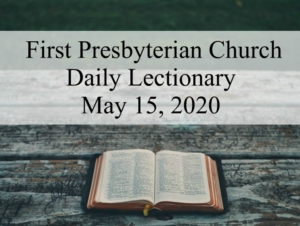
First Reading Leviticus 23:1-22
Second Reading 2 Thessalonians 2:1-17
Matthew 7:1-12
1“Do not judge, so that you may not be judged. 2For with the judgment you make you will be judged, and the measure you give will be the measure you get. 3Why do you see the speck in your neighbor’s eye, but do not notice the log in your own eye? 4Or how can you say to your neighbor, ‘Let me take the speck out of your eye,’ while the log is in your own eye? 5You hypocrite, first take the log out of your own eye, and then you will see clearly to take the speck out of your neighbor’s eye.
6“Do not give what is holy to dogs; and do not throw your pearls before swine, or they will trample them under foot and turn and maul you.
7“Ask, and it will be given you; search, and you will find; knock, and the door will be opened for you. 8For everyone who asks receives, and everyone who searches finds, and for everyone who knocks, the door will be opened. 9Is there anyone among you who, if your child asks for bread, will give a stone? 10Or if the child asks for a fish, will give a snake? 11If you then, who are evil, know how to give good gifts to your children, how much more will your Father in heaven give good things to those who ask him!
12“In everything do to others as you would have them do to you; for this is the law and the prophets.
The theologian Karl Barth said something along the lines that we know God as the Father because we know God as the Son. We don’t project from our own understanding of father-son or parent-child relationships to understand God. Rather, God gives us a glimpse of who we can be in relation to the Father. Few have understood this clearer—or articulated it better—than George MacDonald. MacDonald was a 19th century Scottish pastor, writer, and theologian. He became famous as a, inventor of fairytales in the “kaleyard” school, named after the homey Scottish gardens of the day. C.S. Lewis attributed MacDonald with the conversion of his imagination through books alone (MacDonald died when Lewis was seven). MacDonald spoke of God in relational terms. “God,” says MacDonald, “is like the child: that he is simply altogether our friend, our father—our more than friend, father, and mother—our infinite love-perfect God. Grand and strong beyond all that human imagination can conceive of poet-thinking and kingly action, he is delicate beyond all that human tenderness can conceive of husband or wife, homely beyond all that human heart can conceive of father or mother. He has not two thoughts about us. With him all is simplicity of purpose and meaning and effort and end—namely, that we should be as he is, think the same thoughts, mean the same things, possess the same blessedness.” Now we hear: “how much more will your Father in heaven give good gifts to those who ask him!”—to which we say, “Amen, amen, amen.”
Abba, Father, grant what we need—healing, hope, or help—that we would receive, with your gifts, a glimpse of your giving hand, through the grace of Jesus, your Son. Amen.

Get Social